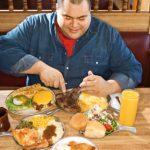 Whether it is Christmas, Thanksgiving or some other special occasion, we are all guilty of over-indulging in a tasty meal from time to time. It can become rather uncomfortable when we have a big meal though. Bloating, fatigue, cramps, nausea, indigestion, and acid reflux are all associated with diets that involve large amounts of food in one sitting.
Whether it is Christmas, Thanksgiving or some other special occasion, we are all guilty of over-indulging in a tasty meal from time to time. It can become rather uncomfortable when we have a big meal though. Bloating, fatigue, cramps, nausea, indigestion, and acid reflux are all associated with diets that involve large amounts of food in one sitting.
With just a little careful thought, there are ways you can feel less full and more comfortable after a big.
Hydrating the right way
Advertisement
You will often hear people say that they like to have wine with a nice meal, but research points to the fact that alcohol slows digestion. In fact, recent studies suggest it reduces digestion by as much as 50 per cent.
Doctors and dieticians suggest that water is the most appropriate beverage when you are eating a big meal. It helps you digest your food by breaking it down so that your body can absorb the nutrients. It will also soften stools, preventing constipation that can often be associated with the mixing a lot of different foods.
Hydration is considered a healthy idea before, during and after any meal; no matter how big or small the portions are.
The role of exercise
The popular theory has always been that if I go for a brisk walk immediately following a huge meal, it will help me drop some of the calories I put on, help me feel less bloated, and make me more comfortable. In reality, scientists say when you walk at a brisk pace with a full stomach your heart is forced to work at twice its rate so you should actually wait 45 minutes to an hour after the meal to do anything really physical. A study at Brigham and Women’s Hospital in Boston indicates that heavy meals increase the risk of heart attack. Having said this, you can benefit from a vigorous walk before the meal. This stimulates your metabolism and it will decrease the amount of sugars and fats that build in your blood after you eat.
Fruits and Vegetables
Food has to be transformed into smaller particles of nutrients before it can be absorbed into the blood and make its way to important cells in the body. Digestion breaks down these small particles of food to nourish cells and give us energy. This process is difficult when you combine certain types of food. For instance, carbohydrates and proteins digest differently so eating large amounts together will make it hard for your system to digest. Some nutritionists believe it takes about 2 hours to digest starches and 4 hours to digest proteins. Starches and proteins together…up to as much as 13 hours.
RELATED READING: Dual Purpose Diets: What Else Can Weight Loss Do?
Fruits and Vegetables don’t create as many digestive problems for people. A lot of fruits and vegetables have high water content. Fruits and vegetables including: apples, pears, peaches, carrots, beets, sweet potatoes, and zucchini are easily digestible. Eating more fruits and vegetables during a big meal will help you feel less full because your body will be that much quicker at processing the food.
Chewing your food
There is a saying, “my eyes are bigger than my stomach”. This means that you see a lot of food you want, but you likely don’t have the room in your tummy to fit it all in. When your family or friends prepare a big feast the temptation can be too much and you dive in and try everything anyway. Whatever you do…chew, chew, chew. The more you chew the more digestive acids you are creating in your body. Studies show that eating large amounts of food and not chewing properly leads to bloating, stomach pain, and constipation.
Advertisement
With these few steps treating yourself to a big meal on those special occasions can be more enjoyable. The emphasis is on “special occasions” since we are reminded that we don’t want our diets to consist of big meals all the time. Over-eating on a regular basis of course can lead to a whole host of health complications.
Related Reading: Eat your way to healthy digestion
Related Reading: Are these common habits harming your digestion?

